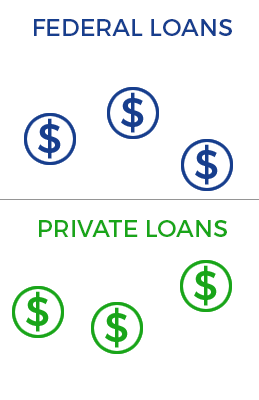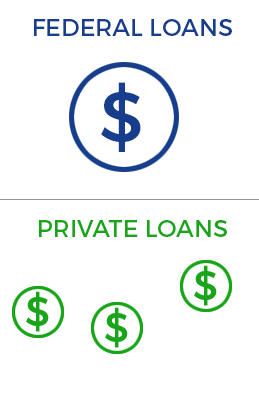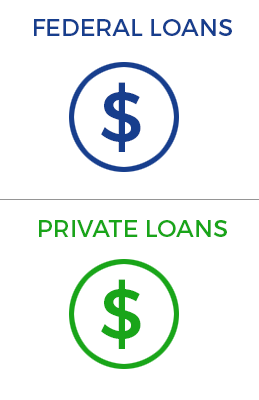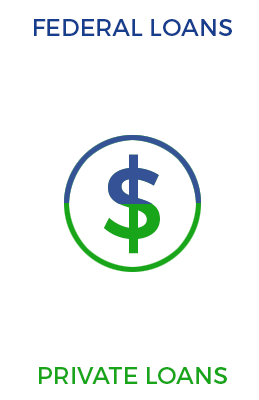
Photo by mikecogh 
If you’ve recently graduated law school, you’re probably trying to adjust to an entirely new lifestyle. You’re no longer a broke college student, but the loans you’ve taken to pay your way through school have been stacking up–big time.
This guide is to help lawyers and law school graduates navigate the process of student loan refinance and consolidation so they can save the most money possible and live comfortably even if they have a lot of debt.
I’m $100,000 in debt, now what?
Sound familiar? Many law students take out well over $100,000 in student loans over the course of undergrad and law school. It can seem overwhelming to think about paying it all back.
But, don’t worry–you’re not alone.
This guide will help you understand your options and walk you through how to determine which ones are right for you. In many cases, law school graduates can save tens of thousands of dollars on their student loans just by understanding their debt and making informed decisions.
- Loan forgiveness options
- National loan assistance programs
- State loan assistance programs
- School-specific loan assistance programs
- Loan consolidation/refinancing options
Loan forgiveness options for lawyers
The good news? Depending on the type of law you practice, you may qualify for loan forgiveness!
But, it’s not a simple process–nor will you qualify right away. Public Service Loan Forgiveness applies only to federal loans and is available only to graduates who work in eligible public service positions (e.g., public defender) for 10 years
So, if you’re aiming for receiving Public Service Loan Forgiveness on your federal student loans, then you will want to plan your career very carefully.
In order to qualify you’ll need to meet all of the following criteria:
- You need to make 120 consecutive payments (10 years)
- You’ll have to be working in public service for all of that time
- You need to work for a qualifying organization
- You’ll have to work full-time hours (30+ hours per week)
If this is an option for you, you’ll likely want to choose an income-based repayment plan that can reduce your monthly payment during the time that you’ll be repaying your loans.
Learn more about Public Service Loan Forgiveness

Loan assistance programs for lawyers
Another great perk of entering the legal field is that there are dozens of programs out there designed to assist you with paying your student loan bill each month.
Many of these programs are specific to certain employers (e.g., U.S. Department of Justice) or confined to law school graduates living in a certain state. But, they can offer some much-needed assistance with your student loan payment.
Department of Justice Attorney Student Loan Repayment Program
Attorneys working for the U.S. Department of Justice with more than $10,000 in federal student loans can qualify for a repayment program offered directly by the department.
The program offers $6,000 per year to eligible candidates, up to a maximum of $60,000. Applicants will need to commit to a three-year service agreement with the Department of Justice.
The program is competitive and awards are paid directly to your loan servicer. The award can be applied to all kinds of federal loans including Stafford, Perkins, Direct and federal consolidated loans.
Learn more about the U.S. Department of Justice loan assistance program
John R. Justice Student Loan Repayment Program
In addition to forgiveness after 10 years, eligible attorneys working in the public sector are eligible to apply for the John R. Justice Student Loan Repayment Program, which provides funds to help law school grads repay their loans.
The program offers up to $10,000 per year and a maximum award of $60,000 lifetime, so it may not cover your entire bill, but it could certainly help to offset your student loan costs.
This program is awarded on a state-by-state basis and eligible graduates apply to the appropriate agency within their state.
See which agency to contact in your state
The Herbert S. Garten Loan Repayment Assistance Program
Graduates with at least $75,000 in debt can apply for this assistance program. Eligible applicants are chosen at random to receive up to $5,600 assistance with student loans and about 70 entrants are selected each year. Attorneys must be employed by an eligible grantee in order to qualify.
Learn more about the qualifying grantees
Loan assistance programs by school
Many law schools offer their own repayment assistance programs specifically for graduates. The terms of each program are a bit different, but they generally award repayment assistance for attorneys working in the public sector.
These programs also generally require graduates to meet certain salary requirements.
Learn more about these programs by checking out this list or by visiting your law school’s website
Loan assistance programs for lawyers by state
Many states offer loan repayment assistant programs (LRAPs) to qualifying attorneys and law school graduates.
Find your current state of residence to see information about available programs:
Student loan consolidation/refinance options for lawyers
If you are not planning on going into public service and the above options won’t work for you, your next option will be to look at options to refinance your student loans.
These options won’t make your loans disappear, but they can make your payments way more manageable. They may be able to save you tens of thousands of dollars if you play your hand correctly.
There are a few ways you can approach student loan refinance.
1. Do nothing
 Okay, you’ve got your loans–you’re just going to continue paying them off as normal. This is an interesting approach, but likely not the best one.
Okay, you’ve got your loans–you’re just going to continue paying them off as normal. This is an interesting approach, but likely not the best one.
This would be a good option if:
- You are planning (and can afford) to pay off all of your loans within 10 years
- You’re not eligible for any kind of forgiveness or loan assistance
- Your interest rate is lower than market rates
- You don’t mind paying multiple bills each month
For most students, this is not a good option–even just consolidating federal loans can help to simplify your payments, if nothing else.
2. Just consolidate your federal loans
 At the bare minimum, most graduates will want to consolidate their federal loans into a single loan. This won’t save you any money (your interest rate will be the weighted average of your original loans).
At the bare minimum, most graduates will want to consolidate their federal loans into a single loan. This won’t save you any money (your interest rate will be the weighted average of your original loans).
But, it will be helpful by allowing you to:
- Condense multiple federal loan payments into one.
- Qualify for longer repayment terms based on your total amount borrowed.
3. Consolidate federal loans, refinance private loans
 In this scenario, you’ll be taking two main steps. First, you’ll be condensing all of your federal loans into a single payment with a weighted-average interest rate (and possibly extending your repayment period). Then, you’ll be refinancing any private loans into a single loan.
In this scenario, you’ll be taking two main steps. First, you’ll be condensing all of your federal loans into a single payment with a weighted-average interest rate (and possibly extending your repayment period). Then, you’ll be refinancing any private loans into a single loan.
Because private lenders won’t allow you to “consolidate” without refinancing, you’ll want to take this step to also condense your private loans into one payment. Depending on your current salary and credit history, you will likely also qualify for a lower interest rate on your private loans if you refinance after graduation.
Refinancing your private loans can help you in a number of ways:
- If your credit score has improved since originally borrowing, you’ll likely qualify for better rates and terms
- You can change your repayment period
- You can add or remove a co-signer
4. Consolidate and refinance all of your loans through a private lender
 This last option is one that many students pursue as a way to simplify their student loan debt into one single payment each month. It can also offer some cost-saving benefits if your circumstances are right.
This last option is one that many students pursue as a way to simplify their student loan debt into one single payment each month. It can also offer some cost-saving benefits if your circumstances are right.
This may be the right option for you if:
- Your federal and private loans have interest rates higher than market rates (generally ~5%, but will vary)
- You have significant private loan debt and want to consolidate it and extend your repayment terms to make your monthly payments more manageable
- You’re planning to pay off your loans over a shorter period of time than your current repayment period (refinancing may qualify you for better rates and terms)
- You want to simplify all of your loans into a single payment
It’s important to know that by refinancing all of your loans (including federal) through a private lender, you will lose the opportunity for certain protections that you could have otherwise been eligible to receive on that portion of your debt.
You’ll no longer be eligible for:
- Income-based repayment plans
- Federal loan deferment
- Federal loan forbearance
That’s not to say that you won’t have any protections. Many private lenders offer things like unemployment protection that will allow you to halt making payments in the event that you lose your job. But, you’ll need to evaluate your options carefully to see which protections are important to you.
State-by-state loan assistance programs (cont.)
Arizona
The Joyce Holsey Arizona Legal Legacy Loan Repayment Assistance Program awards up to $10,000 per year for attorneys working in certain programs that help underserved communities. Eligible attorneys must make $65,000 per year or less and have passed the Arizona Bar.
Learn more about the Joyce Holsey assistance program
District of Columbia
The District of Columbia Bar Foundation Loan Repayment Assistance Program offers up to $12,000 in loan repayment assistance for lawyers working with low-income individuals. In order to qualify, attorneys must work at least 17 hours per week for certain eligible organizations and earn less than about $82,000 per year. Only those in good standing with the D.C. Bar can apply.
Learn more about the D.C. Bar Foundation assistance program
Florida
The Florida Bar Foundation grants up to $5,000 per year to qualifying attorneys for loan repayment assistance. Eligible lawyers must either work for a legal aid or legal services organization that receives support from the Florida Bar Foundation for at least 12 months. They can be employed either full or part-time.
Learn more about the Florida Bar Foundation assistance program
Illinois
Attorneys working in public service are eligible to receive up to $4,000 per year over 5 years from the Chicago Bar Foundation.
This is a competitive loan assistance program available only to attorneys with an outstanding academic record and with more than $40,000 in student loan debt.
Learn more about the Chicago Bar Foundation loan assistance program
Indiana
Indiana attorneys earning $50,000 per year or less can qualify for the Indiana Bar Foundation’s Justice Richard M. Givan loan assistance program. The program awards $5,000 per year to selected candidates. Eligible attorneys must work in the nonprofit sector and have substantial student loan debt.
Learn more about the Indiana Bar Foundation’s loan assistance program
Iowa
Attorneys in the state of Iowa earning less than $50,000 and working full-time for a public interest organization can qualify for the Iowa State Bar Association’s loan assistance program.
The program awards up to $2,000 per year in loan assistance for a number of years depending on the program that the borrower is eligible for.
Learn more about the Iowa State Bar Association’s loan assistance program
Louisiana
The Louisiana Bar Foundation has an assistance program that offers up to $5,000 per year to lawyers making $50,000 per year or less and working for a Foundation-supported organization serving the public.
Lawyers are able to receive this award for multiple years, but they must apply each year to be considered.
Learn more about the Louisiana Bar Foundation’s loan assistance program
Maine
Maine’s Bar Foundation has a loan assistance program for lawyers that work for eligible nonprofit organizations within the state.
The program awards up to $5,000 per year to lawyers that can be used to pay down their student loan balance.
Learn more about the Maine Bar Foundation loan assistance program
Maryland
The Janet L. Hoffman Loan Assistance Repayment Program awards grants to attorneys in the state of Maryland that work with low-income and underserved populations.
Eligible candidates must make $60,000 per year or less and have an undergraduate or law degree from a Maryland college. They must also be employed full time at a qualifying organization.
This program awards between $1,500 and $10,000 per year, based on the amount of student loan debt that the attorney has outstanding.
Learn more about the Janet L. Hoffman loan assistance program in Maryland
Minnesota
Graduates of Minnesota law schools may qualify for the loan assistance program offered through the state of Minnesota.
Eligible attorneys must work for a qualifying nonprofit that serves low-income communities and make less than $51,500 per year, or less than $65,000 per year if they have worked for the nonprofit for 9-15 years.
Preference is given to applicants based on the number of years they have worked for the nonprofit organization.
Rather than a set dollar amount, the award will cover a percentage of the attorney’s monthly student loan payments–between 80 and 95%.
Learn more about the Loan Repayment Assistance Program of Minnesota
Montana
Montana attorneys working in legal aid for underserved communities are eligible for a loan assistance program through the Montana Justice Foundation.
The award of $2,500 is awarded to full-time attorneys and applicants are chosen based on the discretion of the foundation’s board of directors.
Learn more about the Montana Justice Foundation loan assistance program
New Hampshire
The New Hampshire Bar Foundation’s Loan Repayment Assistance Program is open to lawyers in the state working for qualifying public agencies and working with underserved communities across the state.
The award is available for attorneys working either full time or part-time at an eligible organization. The amount of the award is variable and is decided based on factors like the applicant’s income and outstanding student loan balance.
Learn more about the New Hampshire Bar Foundation’s loan assistance program
New Mexico
Eligible attorneys earning less than $55,000 per year and working for a qualifying public or nonprofit organization can earn up to $7,200 per year from the New Mexico Public Service loan repayment assistance program.
Lawyers applying for this program will need to commit to working at least 3 years at the qualifying organization.
Learn more about the New Mexico Public Service loan assistance program
New York
In New York, there is a grant program specifically for those working as District Attorneys, Assistant District Attorneys, or Indigent Local Services Attorneys.
Eligible lawyers must be a resident of the state and work in the position for at least a full year before applying.
The program awards recipients a maximum of $20,400, in increments of $3,400 per year.
Learn more about the New York loan assistance program
North Carolina
The North Carolina Legal Education Assistance Foundation (NC LEAF) Award is for eligible NC attorneys employed by public interest organizations.
Attorneys earning less than $50,000 per year as a prosecutor, public defender, or legal services provider are eligible to apply.
Learn more about the North Carolina loan assistance program
Ohio
Ohio lawyers working with underserved communities are eligible to receive up to $6,000 in loan repayment assistance through the Ohio Legal Assistance Foundation.
Candidates must work full time for a qualifying organization.
Learn more about the Ohio loan assistance program
Oregon
The Oregon State Bar Loan Repayment Assistance Program awards $7,500 per year to eligible attorneys working for qualified non-profits and earning $65,000 per year or less.
Eligible lawyers also must have at least $35,000 in student loan debt. They can receive the award for up to 3 years.
Learn more about the Oregon State Bar loan assistance program
Pennsylvania
The Pennsylvania Bar Foundation Loan Repayment Assistance Program awards lawyers working in public service who make $66,000 per year or less.
Awarded funds are based on the number of applicants and funding availability, so they will vary from year to year.
Learn more about the Pennsylvania Bar Foundation loan assistance program
Texas
The State Bar of Texas loan assistance program offers repayment grants to legal aids working in the state of Texas.
Law school graduates can earn up to $4,800 per year, regardless of income. Each year, approximately 125 applicants are awarded funds through the program.
Learn more about the State Bar of Texas loan assistance program
Vermont
The Vermont Bar Foundation Loan Repayment Assistance Program offers funds to attorneys working for qualifying nonprofits and working with low-income residents within the state.
Lawyers making less than $60,000 per year are eligible to receive funding of up to $5,000 per year to put toward their student loans. Attorneys may reapply each year even if they have received funds in previous years.
Learn more about the Vermont Bar Foundation loan assistance program


